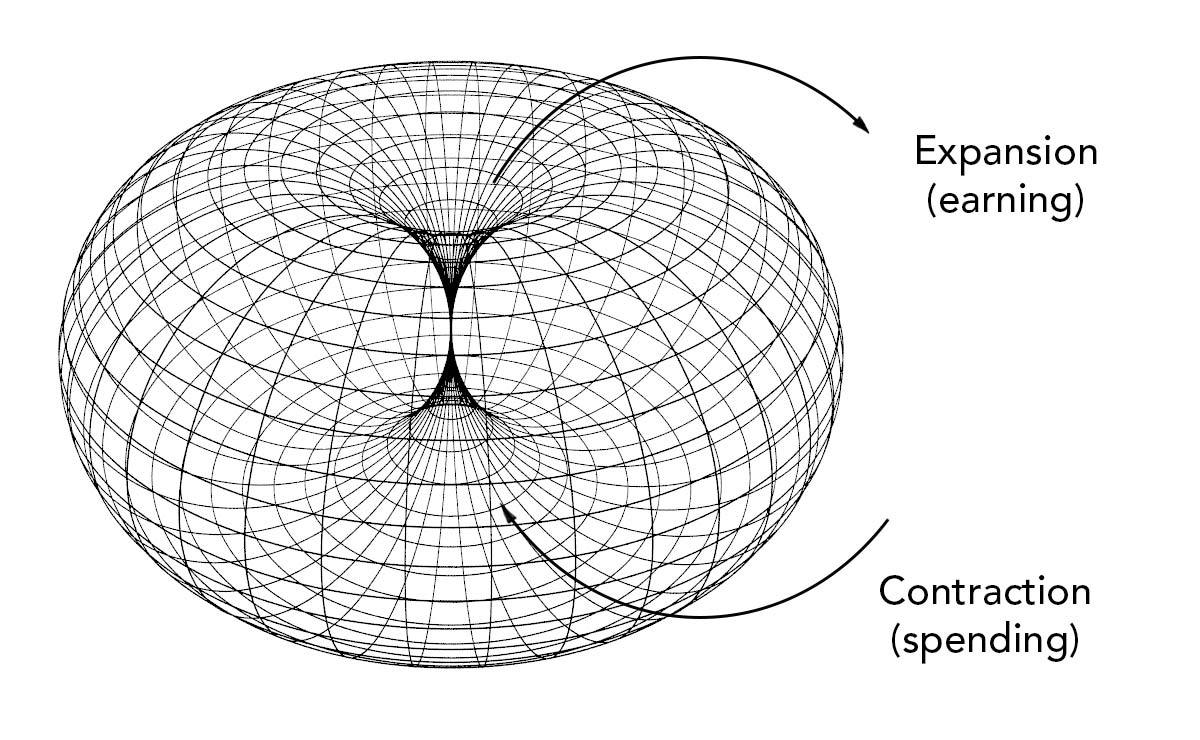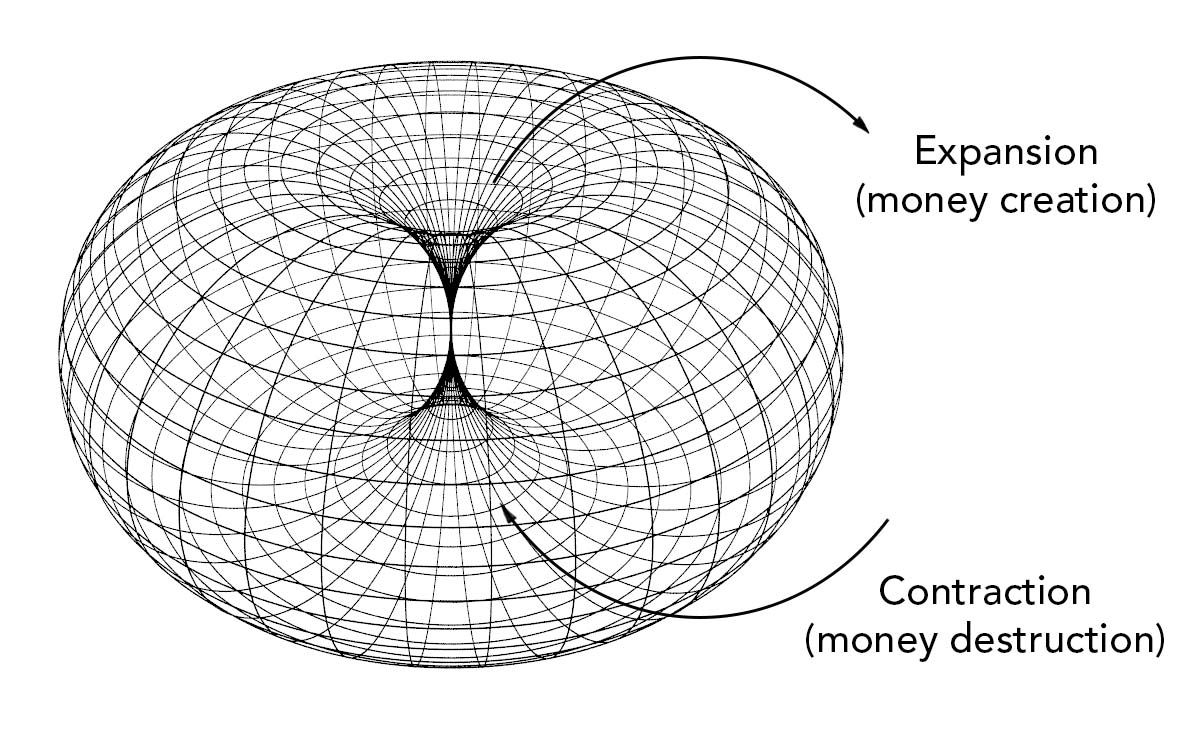Gratitude-Based Financial System
Our current financial system is flawed. Capitalism puts human lives and the well-being of the planet second to profit. This is a self-destructive course; if our children are to have a future, we must change our financial system. I propose a grassroots way of exchanging value – we need a financial system that benefits, empowers and serves everyone.
Status Quo
The intended purpose of a financial system is to provide a way to exchange value. Oligarchical capitalism in its current form perverts this purpose to grant a few people power over everyone else. The planet and people have been turned into expendable commodities.
The essence of money in our current financial system is “power and control,” and this fuels all corruption, wars, genocide, child labor and human trafficking.
Fractional reserve banking means that there are parasites in our current financial system – this is mathematically proven by Vladimir Z. Nuri in an exposé called “Fractional Reserve Banking as Economic Parasitism”. This means that a big part of the value we create is taken away when we exchange it for money.
Money creation
Our current financial system is based entirely on debt. Money is created at the level of governments and banks in the form of loans, which have to be returned with interest. Inflation, as an inevitable result of this pyramid scheme, serves to administer “power and control” over the people, who create value.
Scarcity mentality
Many people believe that in order for them to have something, they must first take it from others. This “competing for resources” has contributed to entrenching a contrived scarcity mentality in the minds of the entire humankind. Scarcity mentality is the root cause of a great deal of human suffering, depression and disease. Scarcity mentality goes against the very nature of our existence and affects all aspects of our lives: our health, wealth and relationships. This mentality of “competing for resources” is also largely responsible for much of pollution, deforestation and other examples of devastation of the environment.
Existing alternatives
- Money creation belongs to those people, who “mine” bitcoins – those, who have server farms, and the electricity to run them. This makes money creation exclusive and not environmentally sound.
- There is a fixed total amount of bitcoins provisioned by this system. This implies that over time some wallets are lost forever (as has already happened), which means inevitable deflation of bitcoin. Plus, there is no way to prevent monopolization of currency in the hands of a few people, who can then manipulate markets and turn bitcoin into the same instrument of “power and control”, as the current model.
What is a financial system?
A “financial system” is a collective agreement. Sure, there are laws – written, spoken and unspoken – but a financial system mostly resides in our minds. In other words, the system is this way only because we agree on it. Therefore, in order for our financial system to change, our psychology has to change. This includes each individual’s and the collective definition of ourselves, other people, the planet, the concepts of value, its creation and exchange, as well as the essence of money.
Cornerstones
Abundance mentality
The nature of our existence is abundance. This becomes especially clear when you look at nature and observe its immense fertility and diversity. If we want to be fulfilled and healthy, we must return to the abundance mentality, and our value exchange system must also reflect this.
Sovereign Being
A sentient being is not a commodity. Each sentient being is sovereign by definition, and no one else has the right to have power over a sentient being. Our value exchange system must respect each sentient being’s sovereignty, and protect all sentient beings from abuse.
Planet first
Our planet – the environment and all the living things on it – is the one most important, invaluable entity. It is a living organism, which can be self-aware if each of us changes our individual psychology to identify with the planet as a whole. The sanctity of our planet must be protected by our value exchange system.
Essence of money
The most constructive, serving and wholesome definition of money that I have come across is “gratitude.” In other words, the best purpose for paying someone is to express gratitude in return for the value they provide.
The Idea
If we consider that 1) money is equivalent to the value it represents, and 2) people create value as a result of their work, then we arrive at the conclusion that 3) money creation must be in the hands of the people, who create value.
Units of exchange
One unit of exchange is one “Thank-You” or “Gratitude Unit” or “GU”.
Money creation
Money is created when value changes hands – during the transaction. In other words, when you provide me with value – a cup of coffee, for example, which costs 1 GU – I feel grateful for it, and I “Thank You.” This one Gratitude Unit is created at the time of the transaction and transferred to your account. Nothing is taken from my account at this point, since the price is only 1 GU.
When you continue to provide value to people in this way, your account grows, and you can then use your GUs to buy goods and services, which the seller has priced at more than 1 GU. For example, you get a haircut that costs 10 GUs: 1 Thank-You is created as always, during the transaction, and given to the barber, in addition to 9 GUs that are transferred from your account to the account of the barber, to make 10.
Inflation
When you consider the amount of possible daily transactions, it’s easy to see that inflation would quickly become a problem: over time 1 Thank-You would carry less and less value, prices would increase, and very soon the entire system would become unusable. Therefore, in order to curb inflation, money also has to be destroyed.
Money destruction
The process of money destruction also takes place during each transaction, with one important distinction: a fraction of the total price is destroyed during every transaction. The exact ratio of how much money is transferred vs. how much money is destroyed during each transaction can potentially be optimized based on factors like how many people there are in the world, and how many transactions per day take place, but for the moment let’s consider that 5% of the money is destroyed every time money changes hands.
The destruction “tax” can be levied on the seller, the buyer, or it can be distributed between the two. Let’s consider a 50-50 distribution of the destruction “tax”.
The barbershop example above would be modified as follows. 1 Thank-You is created and given to the barber entirely, just as before. 5% of 10 is 0.5, so 0.5 GUs must be destroyed during this transaction – 0.25 from your, and 0.25 from the barber’s account. This means that 9.25 GUs is transferred from your account instead of the above mentioned 9, and the barber gets 9.75 GUs instead of 10.

Individual wallet

Financial system
What We Get
This results in a fair and transparent value exchange system, which expands and contracts proportionally to the value being provided, and thus serves everyone involved.
Gratitude
Scientific research shows that the emotional state of gratitude and appreciation is conducive to good health and wellbeing. Consider the implications of the entire world using a financial system that is based on the offering of gratitude.
Abundance mentality
This value exchange system promotes creation of value instead of competing for resources. This has the potential of changing the individual and collective psychology of the entire civilization from scarcity and competition to that of abundance, collaboration and service.
Decentralization
This value exchange system decentralizes control and gives buying and selling power back to the people, who create value. There is no room for a parasite in this system, so people’s value production is rewarded in its entirety.
Incentives
This system incentivizes collaboration, because everyone has the same power to create money and to pay for the value they receive. This system promotes truly constructive endeavors and win-win-win scenarios, where everyone involved – including the planet – stands to benefit. Crowdfunding can become an even more powerful method of collaboration, since donors don’t have to have the Gratitude Unit they’re donating to the cause they want to support. Consider the power of millions of people sending their gratitude – and newly created money as the result – to fund projects like cleaning up the oceans and planting trees.
Deterrents
This system disincentivizes speculation, mass-scale financial manipulation and other forms of parasitism, because a fraction of the transferred sum is destroyed at every transaction. In other words, this system makes it unprofitable to manipulate money without providing value.
Best of both worlds
This system allows a capitalist-entrepreneur to provide even more value (since he is not feeding a parasite) and to build enterprises, which benefit humanity and the planet. Note that this system does not “do away with rich people” or disincentivize luxury. People can be as rich as they want – in proportion to the value they provide. This system also works for a socialist, who is concerned with the well-being of ordinary people – a financial system based on gratitude and abundance means that everyone has food and shelter, so poverty can become a thing of the past. The fundamental difference in this value-exchange system is that it leaves no room for parasites.
Technical how-to’s and security concerns
Once we understand that this value-exchange system is a good idea, we can consider how to implement it technologically, and how to make it secure and abuse-proof. Some of the technology that may be required is already in use today, including open-source systems, blockchain technology and quantum encryption.
For example, the value exchange system may be set up to prevent kick-backs (I will Thank-You if you Thank-me), multi-party “circular” kick-backs (I will Thank John if John Thanks you if you Thank me), and other similar “money farming” schemes that do not provide value. Technological limitations may be set up to prevent abuse, for example: no more than 1 wallet per person, a person can create no more than 25 GUs in a 24-hour period, etc. I would argue that only a sentient being can have a wallet (companies would have to figure out their finances internally).
Implementation of blockchain technology would mean that all transactions, money creation and money destruction may be redundantly recorded, and thus verifiable and traceable. This is by no means an exhaustive list of security concerns; more thought will need to be put into making this system sound.
Implementation
The gratitude-based value exchange system must be built alongside the existing financial system. The propagation of the new system may be slow initially, since everyone will start off at zero GUs. The use of the system would begin with paying for small goods or services that cost 1 GU, and slowly moving to encompass more expensive and complex goods and services. The transition to full use of the system will likely be gradual.
I am looking for collaborators to help bring this idea into the world. If you resonate with this idea, and have expertise in physics, mathematics, finance, and blockchain programming, please contact me.
